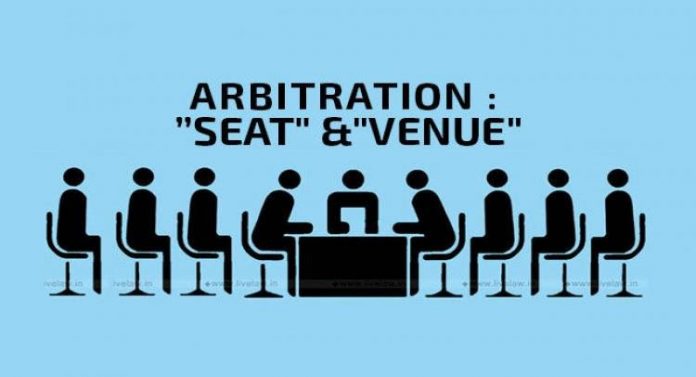This article is written by Priyal Pingle, pursuing a Certificate Course in Arbitration: Strategy, Procedure and Drafting from LawSikho.com.
Table of Contents
Introduction
Rapid globalisation and an increase in transnational transactions have led to a significant increase in commercial disputes. Due to this, there is an urgent need for a quick and efficient mechanism of adjudicating disputes. This explains the rise of the era of international commercial arbitrations. Arbitration is a private process of settling a dispute between the parties to a contract without the help of a court. It is the arbitrator who helps in settling the dispute. Arbitration is the flexible and consensual process to settle disputes between parties to a contract, where parties refer the dispute to a third party. Arbitration is an alternate dispute settlement mechanism that helps in reducing the burden on courts. Arbitration is meant to be an alternative to courts which provides a speedier remedy for dispute resolution.
The Arbitration and Conciliation Act, 1996 under Section 2(1)(f) defines the term “international commercial arbitration.” The arbitration may involve parties from any nationality. This causes an issue of conflict of laws between two or more jurisdictions. The doctrine of party autonomy plays an important role in avoiding conflicts between jurisdictions. It allows the parties to choose the seat of arbitration, the venue of the arbitration, and the law that is applicable to the contract itself. This article explains the difference between the seat and the venue of the arbitration. Also, it clarifies whether the seat of the arbitration changes if the venue of arbitration is changed by the parties mutually. 
Seat and venue of arbitration
The Arbitration and Conciliation Act, 1996 does not define the concepts of seat and venue. The concept of seat and venue is important to determine the applicable law governing the arbitration including the procedural aspect and the extent to which it is applicable. The seat of arbitration determines the applicable law for the conduct of arbitration proceedings. The law that is applicable to the arbitration proceeding is the law of the juridical seat of the arbitration. The seat of arbitration also determines which court will have the supervisory power over the arbitration. The seat of arbitration determines the scope of those powers in relation to the enforcement of awards. The seat is determined by the substantive law based on which the dispute referred to arbitration is finally adjudicated upon.
- For example – If the seat is in Mumbai then the arbitration proceeding will be governed by the Arbitration and Conciliation Act, 1996 and the courts of Mumbai will have the jurisdiction to entertain a challenge to the arbitral award or any other order passed by the arbitral tribunal.
The term ‘venue’ refers to a physical location where the arbitration hearings or deliberations are held. According to Section 20 of The Arbitration and Conciliation Act, 1996, parties are free to agree on the place of arbitration. The term venue has no relevance towards the curial law and substantive law to the dispute.
- Example of a venue of arbitration – If Singapore is a venue of the arbitration, it means that the arbitration proceeding will take place in Singapore.
The case of Bharat Aluminium Co vs Kaiser Aluminium Technical (2012) drew a distinction between the seat of arbitration and place of arbitration. The Supreme Court clearly stated that when parties choose any country as a seat of arbitration, then those parties deliberately accept the law of that country. Law of that county relating to the conduct and supervision of arbitration will apply to the proceedings. The Supreme Court in Enercon (India) Limited and Ors. v. Enercon GMBH and Anr 2014 stated that “the location of the seat of Arbitration will determine the courts having exclusive jurisdiction to oversee the arbitration proceedings.”
Can the seat of the arbitration be changed if the venue changes?
M/s Inox Renewables Ltd. v. Jayesh Electricals Ltd
- In a recent judgment M/s Inox Renewables Ltd. v. Jayesh Electricals Ltd dated 13 April 2021, the Hon’ble Supreme Court of India held that when the parties to a dispute change the venue of the arbitration by mutual agreement, the changed venue will become the seat of the arbitration. The courts of the new venue will have jurisdiction over the arbitral proceeding.
- In the above case, Vadodara had been designated as the seat of the arbitration under the business transfer agreement and the courts in Vadodara were given exclusive jurisdiction over the disputes arising out of the same.
- The venue of the arbitration was Jaipur. Later on, the parties had mutually agreed that the venue/place of arbitration would be Ahmedabad and accordingly, the proceedings were conducted at Ahmedabad.
- The appellant challenged the award under Section 34 before the commercial court at Ahmedabad, which was opposed by the respondent on the ground that Vadodara courts alone had jurisdiction over the arbitration. The appellant challenged the said Order before the Gujarat High Court. Relying on the arbitration clause contained in the Purchase Order, the Gujarat High Court held that the exclusive jurisdiction was vested in the courts at Rajasthan. Challenging the impugned judgment, the appellant filed an appeal before the Supreme Court.
- The Supreme Court while setting aside the order of the Gujarat High Court, held that the shifting of the venue from Jaipur to Ahmedabad was with reference to Section 20(1) of the Act and not Section 20(3). Section 20(1) of the Act states that the parties are free to agree on the place of the arbitration
- The Supreme Court took into consideration that the parties had by mutual agreement shifted the place or seat of the arbitration from Jaipur to Ahmedabad.
- The Hon’ble Supreme Court of India held that it is open for parties to an arbitration agreement to change the seat of arbitration by mutual agreement. Even if such an agreement is not in writing, it would be considered valid if it is recorded in the award and not challenged by either party.
- This fact recorded by the sole arbitrator in the arbitral award was sufficient for the court to uphold the change of the seat, more so, since neither party had challenged the arbitrator’s ruling as to the seat of arbitration. Thus, the court held that the courts at Rajasthan are no longer vested with the jurisdiction to entertain any of the applications under any provision of the Act.
BSG SGS SOMA JV v. NHPC Limited (2020)
- The Hon’ble Supreme Court of India relied on its decision in BSG SGS SOMA JV v. NHPC Limited (2020), in which the court held that a venue will be considered as the juridical seat unless there is any contrary intention indicated by the parties. The court stated that the expression “shall be held” also indicated that the “venue” was really the “seat” of arbitration proceedings.
Based on the aforesaid judgments, it may be concluded that whenever in an arbitration proceeding a place of arbitration is decided as the venue of the Arbitration the expression arbitration proceedings would make it clear that the venue is really the seat of the arbitral proceedings as the aforesaid expression does not show any contrary intention indicated by the parties. The fact that the arbitral proceedings shall be held at a particular place would also indicate that the parties are intended to anchor arbitral proceedings at a particular place, which indicates that place as the seat of the arbitral proceedings. This, coupled with there being no other significant contrary indication that the stated venue is merely a venue and not the seat of the arbitration proceedings, would then conclusively show that such a clause designates a seat of the arbitral proceedings.
Conclusion
Above mentioned judgments help to understand that when the venue of the arbitration is changed mutually by the parties to the dispute, the seat will be changed unless there is any contrary intention indicated by the parties. Parties should be careful while deciding the venue and the seat of the arbitration. Whenever a place of arbitration is designated, in an arbitration clause as the venue of the arbitration proceedings, the language used has to be such as tribunals are to meet witnesses or experts or the parties where only hearings are to take place in the venue, this may lead to the conclusion, that the venue so decided is not the seat of arbitral proceedings but only a convenient place of meeting.
The court has clearly stated that the seat of the arbitration is related to an exclusive jurisdiction clause. Where parties designate words like a venue or place instead of using the word ‘seat’ in the arbitration agreement, such venue will be considered to be the seat in the absence of any contrary indication in the agreement. The linkage between the seat, place, or venue of the arbitration with the jurisdiction of courts continues to puzzle users of arbitration. To avoid delay and deliberations during and after the arbitration proceedings it is advisable that parties should draft their arbitration clauses in their agreements with more clarity, expressly specifying the seat or place of arbitration.
Students of LawSikho courses regularly produce writing assignments and work on practical exercises as a part of their coursework and develop themselves in real-life practical skills.
LawSikho has created a telegram group for exchanging legal knowledge, referrals, and various opportunities. You can click on this link and join:
 Serato DJ Crack 2025Serato DJ PRO Crack
Serato DJ Crack 2025Serato DJ PRO Crack









 Allow notifications
Allow notifications


